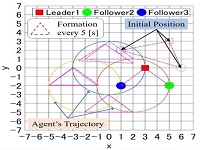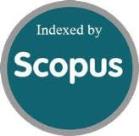Consensus via Adaptive Gain Controllers Considering Relative Distances for Multi-Agent Systems
Keywords:
multi-agent systems (MASs), consensus, relative distance, adaptive gain controller, linear matrix inequality (LMI)Abstract
In this paper, for multi-agent systems (MASs) with leader-follower structures, we present a linear matrix inequality (LMI)-based design method of an adaptive gain controller considering relative distances between agents. The proposed adaptive gain controller consists of fixed gains and variable ones tuned by time-varying adjustable parameters. The objective of this paper is to derive enough conditions for the existence of the proposed adaptive gain controller which achieves consensus for each agent. The advantages of the proposed adaptive gain controller are as follows; The proposed controller can be obtained by solving LMI, and the proposed control system can achieve consensus and formation control, even if uncertainties are included in the information for relative distances. In this paper, we show that the design problem of the proposed adaptive gain controller can be reduced to the solvability of LMI. Finally, simple numerical examples are included to illustrate the effectiveness of the proposed adaptive gain controller for MASs.
References
M. Norton, Modern control engineering, Pergamon Press, 1972.
B. D. O. Anderson and J. B. Moore, Optimal control-linear quadratic method, Prentice Hall, New Jersey, 1990.
K. Zhou, Essentials of robust control, Prentice Hall, 1998.
B. R. Barmish, “Stabilization of uncertain systems via linear control,” IEEE Trans. Automat. Contr., vol. 28, no. 8, pp. 848-850, August 1983.
I. R. Petersen and C. C. Hollot, “A riccati equation approach to the stabilization of uncertain linear systems,” Automatica, vol. 22, no. 4, pp. 397-411, July 1986.
K. Hagino and H. Komoriya, “A Design method of robust control for linear systems,” IEICE Trans. Fundamentals, vol. J72-A, no. 5, pp. 865-868, May 1989. (in Japanese)
P. P. Khargonekar, I. R. Petersen, and K. Zhou, “Robust stabilization of uncertain linear systems: quadratic stabilizability and control theory,” IEEE Trans. Automat. Contr., vol. 35, no. 3, pp. 356-361, March 1990.
I. R. Petersen and D. C. McFarlane, “Optimal guaranteed cost control and filtering for uncertain linear systems,” IEEE Trans. Automat. Contr., vol. 39, no. 9, pp. 1971-1977, September 1994.
S. Yamamoto and K. Yamauchi, “A design method of adaptive control systems by a time-varying parameter of robust stabilizing state feedback,” Tran. ISCIE, vol. 12, no. 6, pp. 319-325, May 1999. (in Japanese)
M. Maki and K. Hagino, “Robust control with adaptation mechanism for improving transient behavior,” Int. J. Contr., vol. 72, no. 13, pp. 1218-1226, November 1999.
H. Oya and K. Hagino, “Robust control with adaptive compensation input for linear uncertain systems,” IEICE Trans. Fundamental, of Electronics, Communications and Computer Sciences, vol. E86-A, no. 6, pp. 1517-1524, June 2003.
D. D. Siljak, Decentralized control of complex systems, New York, Academic Press., 1991.
R. Olfati-Saber and R. M. Murray, “Consensus problems in networks of agents with switching topology and time-delays,” IEEE Trans. on Automat. Contr., vol. 49, no. 9, pp. 1520-1533, September 2004.
G. Xie and L. Wang, “Consensus control for a class of networks of dynamic agents: fixed topology,” Proc. of the 44th IEEE Conference on Decision and Control, and the European Control Conference 2005, pp. 96-101, Seville, Spain, December 2005.
Y. Zhang and Y. P. Tian, “Consentability and protocol design of multiagent systems with stochastic switching topology,” Automatica, vol. 45, no. 5, pp. 1195-1201, May 2009.
G. Zhai, S. Okuno, J. IMAE, and T. Kobayashi, “A matrix inequality based design method for consensus problems in Multi-Agent Systems,” Int. J. Appl. Math. Comput. Sci., vol. 19, no. 4, pp. 639-646, April 2009.
W. Ni and D. Cheng, “Leader-following consensus of multi-agent systems under fixed and switching topologies,” Systems & Control Letters, vol. 59, no. 3-4, pp. 209-217, March-April 2010.
D. Zhang, Z. Xu, Q. G. Wang, and Y. B. Zhao, “Leader-follower H∞ consensus of linear multi-agent systems with aperiodic sampling and switching connected topologies,” ISA Transactions, vol. 68, pp. 150-159, May 2017.
W. He, C. Xu, Q. Han, F. Qian, and Z. Lang, “Finite-time ℒ2 leader-follower consensus of networked euler-lagrange systems with external disturbances,” IEEE Transactions on Systems, Man, and Cybernetics: Systems, vol.48 no. 11, pp. 1920-1928, November 2018.
T. Namerikawa, “Control theoretical approach to multi-agent problems,” Institute of Electronics, Information, and Communication Engineers, IEICE Technical Report NC2008-1, May 2008. (in Japanese)
S. Nagai, H. Oya, T. Kubo, and T. Matsuki, “Synthesis of decentralized variable gain robust controllers for a class of large-scale interconnected systems with mismatched uncertainties,” Int. J. Syst. Science, vol. 48, no. 8, pp. 1616-1623, July 2017.
C. Yoshioka and T. Namerikawa,” Consensus problem for multi-agent system and its application to formation control,” Transaction of The Society of Instrument and Control Engineers, vol. 44, no. 8, pp. 663-669, August 2008. (in Japanese)

Published
How to Cite
Issue
Section
License
Submission of a manuscript implies: that the work described has not been published before that it is not under consideration for publication elsewhere; that if and when the manuscript is accepted for publication. Authors can retain copyright in their articles with no restrictions. is accepted for publication. Authors can retain copyright of their article with no restrictions.
Since Jan. 01, 2019, AITI will publish new articles with Creative Commons Attribution Non-Commercial License, under The Creative Commons Attribution Non-Commercial 4.0 International (CC BY-NC 4.0) License.
The Creative Commons Attribution Non-Commercial (CC-BY-NC) License permits use, distribution and reproduction in any medium, provided the original work is properly cited and is not used for commercial purposes.



